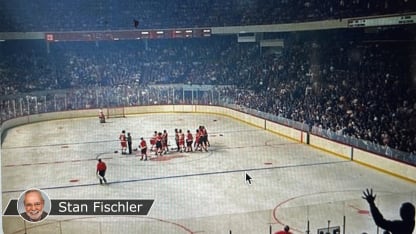Legendary hockey reporter and analyst Stan Fischler writes a weekly scrapbook for NHL.com. Fischler, known as "The Hockey Maven," shares his knowledge, brand of humor and insights with readers each Wednesday.
Today, Stan continues a series of reminiscences about his first visits to arenas from the NHL Original Six era with a look at his initial trip to Olympia Stadium in Detroit for Game 6 of the 1961 Stanley Cup Final.
First visit to Olympia was memorable for Fischler
Saw Black Hawks win Stanley Cup in 1961 at Detroit's 'Old Red Barn'

By
Stan Fischler
Special to NHL.com
By the time the 1960-61 NHL season began, I had become a full-time columnist for Hearst's evening daily, the New York Journal-American. I also wrote hockey for Sport magazine, a monthly publication, as well as for The Hockey News, a weekly. One of my favorite subjects during that Original Six era was goalie Glenn Hall, then starring for the Chicago Black Hawks (as they were known then). I persuaded Jack Zanger, my editor at Sport, that Hall would make a good magazine feature. He agreed, especially since Chicago appeared to have a good shot at winning the 1961 Stanley Cup.
Sure enough, the Black Hawks dethroned the five-time champion Montreal Canadiens in the Semifinals and moved into the Stanley Cup Final against the Gordie Howe-led Detroit Red Wings. Because of my newspaper commitments, I could not interview Hall in person until Game 6 of the Final. By that time, the colorful Black Hawks -- future Hockey Hall of Famers Bobby Hull and Stan Mikita were already among the biggest stars in the NHL -- had taken a 3-2 lead in the series.
Chicago was within one victory of winning the Stanley Cup for the first time since 1938. Since Game 6 would be played at Detroit's Olympia Stadium, this would be a double-dip deal for me -- I'd be interviewing my favorite goalie while visiting the home of the Red Wings for the first time, after hearing and reading about it for years.
As I would see firsthand, the Olympia featured some idiosyncrasies that intrigued the visiting media -- and not always positively. One was that out-of-town announcers had to work from a dubious location at the organ loft. The other was that Olympia's ice surface had slight but significant abnormal contours in the corners, producing a curious, billiard effect when pucks caromed off the walls.
"We knew how to get unusual bounces off our boards," Howe recalled. "It gave us a bit of an advantage over the visiting team."
When I arrived at the corner of Grand River Avenue and McGraw Street, I immediately knew what Detroit residents meant when they referred to the Olympia as "The Old Red Barn." The arena was covered with red brick adorned by a huge vertical sign hanging from the side of the building audaciously proclaiming "Olympia."
Once inside, I could see an arena layout roughly equivalent to New York's Madison Square Garden. Olympia's blueprints included street-level seating plus a mezzanine and balcony. Ground was broken on March 8, 1927, and construction was completed in no more than eight months. At the time of its world premiere on Oct. 15, 1927, Olympia's original seating capacity of 11,563 was second in North America to Madison Square Garden's 15,925.
The game itself proved a downer for the home fans after Parker MacDonald put Detroit ahead with a first-period goal. From that point on, Hall excelled while Detroit goalie Hank Bassen proved unequal to the task. Reg Fleming beat him in the second period, followed by the eventual game- and Cup-winning goal by Ab McDonald.
Hopes for a Detroit comeback were quickly quashed in the third period by Eric Nesterenko, who beat Bassen at the 57-second mark. Less than six minutes later, Blackhawks defenseman Jack Evans, who almost never scored, made it 4-1. A goal by Ken Wharram provided closure -- a 5-1 victory good for Chicago's third Stanley Cup championship and first in 23 years.
If the decision proved to be an anticlimax to the home fans, imagine the downer experienced by the new champs. Owner Arthur Wirtz had planned to fly his team back to Chicago for a gala celebration at a downtown hotel directly after the game. But when the new champions exited the building, they found themselves in the middle of a blizzard and were forced to hold a makeshift victory party in a suite at Detroit's Leland Hotel.
It wasn't a total loss for me because I managed to interview Hall during the impromptu Cup celebration. It was there that "Mr. Goalie" delivered one of the best, terse lines any hockey player ever gave me. Hall was standing alone in a corner, sipping a beer, when I very excitedly asked him to explain how it felt to win the Stanley Cup for the first time.
Hall thoughtfully took a sip from his beer can and then, in his typically subdued manner, replied, "I'm enthused!" (So was I, later, when the article appeared, as was everyone at Sport.)

















